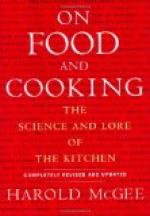[Table Note A: Small quantities of albumen, citric acid, citrate of potash, cellulose, etc.]
[Table Note B: Sugar and pectose.]
[Table Note C: Starch, pectose, etc.]
There is a prevailing notion that the free use of fruits, especially in summer, excites derangement of the digestive organs. When such derangement occurs, it is far more likely to have been occasioned by the way in which the fruit was eaten than by the fruit itself. Perhaps it was taken as a surfeit dish at the end of a meal. It may have been eaten in combination with rich, oily foods, pastry, strong coffee, and other indigestible viands, which, in themselves, often excite an attack of indigestion. Possibly it was partaken of between meals, or late at night, with ice cream and other confections, or it was swallowed without sufficient mastication. Certainly, it is not marvelous that stomach and bowel disorders do result under such circumstances. The innocent fruit, like many other good things, being found in “bad company,” is blamed accordingly. An excess of any food at meals or between meals, is likely to prove injurious, and fruits present no exception to this rule. Fruit taken at seasonable times and in suitable quantities, alone or in combination with proper foods, gives us one of the most agreeable and healthful articles of diet. Fruit, fats, and meats do not affiliate, and they are liable to create a disturbance whenever taken together.
Partially decayed, stale, and over-ripe, as well as unripe fruit, should never be eaten. According to M. Pasteur, the French scientist, all fruits and vegetables, when undergoing even incipient decay, contain numerous germs, which, introduced into the system, are liable to produce disturbances or disease. Perfectly fresh, ripe fruit, with proper limitations as to quantity and occasion, may be taken into a normal stomach with impunity at any season.
It is especially important that all fruits to be eaten should not only be sound in quality, but should be made perfectly clean by washing if necessary, since fruit grown near the ground is liable to be covered with dangerous bacteria (such as cause typhoid fever or diphtheria), which exist in the soil or in the material used in fertilizing it.
Most fruits, properly used, aid digestion either directly or indirectly. The juicy ones act as dilutents, and their free use lessens the desire for alcohol and other stimulants. According to German analysts, the apple contains a larger percentage of phosphorus than any other fruit, or than any vegetable. In warm weather and in warm climates, when foods are not needed for a heat-producing purpose, the diet may well consist largely of fruits and succulent vegetables, eaten in combination with bread and grains. In case of liver and kidney affections, rheumatism, and gout, the use of fruit is considered very beneficial by many scientific authorities.




